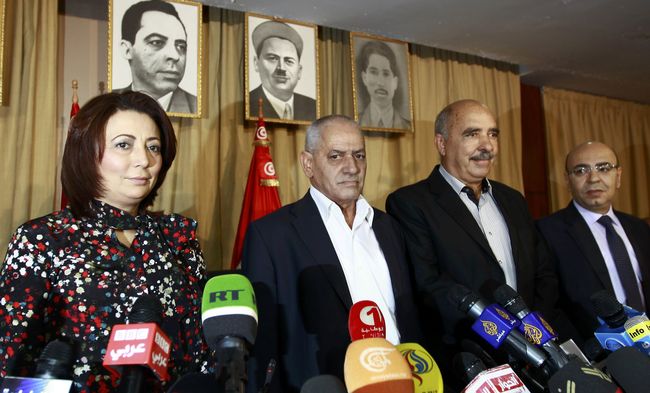Nobel Prize for resetting of power
Tunisian experience, or why Ukrainians failed to reach success after two revolutions?
The winners of the Nobel Peace Prize in 2015 are the leaders of the Tunisian National Dialogue Quartet for their contribution to the country’s transition to democracy. According to the head of the Nobel Committee Kaci Kullmann Five, the group has made a considerable contribution to the building of a pluralistic democracy after the revolution of 2011, which is known as Jasmine Revolution.
The Tunisian Quartet consists of representatives of four organizations: the Tunisian General Labor Union; Tunisian Union of Industry, Trade and Handicrafts; Tunisian Human Rights League, and the Tunisian Order of Lawyers. These organizations represent different sectors and values of the Tunisian society: working class and welfare, principles of the rule of law, and human rights.
“The quartet was formed in the summer of 2013 when the democratization process was in danger of collapsing as a result of political assassinations and widespread social unrest,” Kaci Kullmann Five noted.
“It established an alternative, peaceful political process at a time when the country was on the brink of civil war,” she said.
“TUNISIAN TRANSFORMATION MUST SERVE AS A MODEL FOR US”
Hennadii DRUZENKO, lawyer, public figure:
“Yes, it is fair, because in the 2010s only Tunisia managed to go through a peaceful resetting of the country. And it did it even better than civilized Iceland, because Tunisia not just managed to prevent a civil war, like everyone against everyone in Egypt; it did not fall in stagnation, like in Ukraine, when in a sense the system has revived. First, Tunisia managed to do this in a constitutional way, convene the Constituent Assembly, which created a new constitution. Besides, through a peaceful process of negotiation they have come from an authoritarian paradigm, which has dominated in the country for decades, to a process, which is quite democratic. That was the only real and successful resetting since the time of, probably, the Orange Revolution. This success, if we speak about democracy, is even better than Mikheil Saakashvili’s success, the only example in the post-Soviet space. Saakashvili’s reforms are a priori authoritarian reforms. There was a strong leader who led everyone. What will happen to the country, when he leaves the stage? This is a big question.
“In Tunisia we can see something that can be called a real re-establishment of a state. And they achieved it with small losses, even compared to Ukrainian Maidan. So, I think the decision of the Nobel Committee is more than fair. Because no other country can offer the same story of success.
“The Nobel Committee summed up that the Tunisian example can become a prototype for Near East and Africa. It can be an example, above all, for Ukraine. We talk about new people, new laws, but in fact we need to change the system, like on a PC. This is the only example of successful transformations. There is also a well-known Iceland example, but the politicians in Iceland after all blocked the approval of the constitution, and it has been shelved for three years. And in Tunisia this process had a logical end and it was not followed by bloodshed, unlike the French, Ukrainian, Libyan, or Egyptian revolutions. Tunisian transformation must serve as a model for us. Unfortunately, we scarcely know about it. I am very glad that namely the Tunisian quartet was awarded. This will draw the attention of the world community of Ukrainians to the way of resetting the country.”
“HEALTHY CREATIVE BASIS IN ISLAM AMONG THE YOUNG PEOPLE HELPED MAKE POSITIVE TRANSFORMATIONS IN TUNISIA”
Ruslan HRABAR, Africa expert:
“Arabic countries have a totally different mentality, especially the ‘black Africa.’ As for Tunisia, everything depends on a subjective factor. They have what we lack – a kind of a consolidation line which is the center of everything. This is a country with one people and one ideology, religion – Islam. And this line has helped them consolidate around a desire to move forwards. Muslim communities have many pluses and minuses, there are radicals, etc. But there is no Islamic radicalism in Tunisia, and the healthy basis of Islam in a sense created the political system they have now.
“Speaking about the refugees to Europe, which mostly include Muslims, this reminds me of the collapse of the Roman Empire – the seizure of Europe by the creative part of Muslims. Young, healthy, and educated Arabs arrive there, and they can do anything to the European civilization.
“And this healthy, creative basis in Islam among the young people helped make positive transformations in Tunisia. All the more so, they didn’t have tyranny, like their neighbors in Libya with Muammar Qaddafi. They were more inclined for democracy. At the same time, it should be noted that democracy is not a choice of institutes, but a certain civilization level of society. With the help of the French, this level was achieved in Tunisia and Algeria to a considerable extent. European traditions plus health Islamic root has very much helped the Tunisians.
“Today we don’t have any core – neither ideology, nor national ideas. We have no things around which we could consolidate.
“As for the question, why we have failed after two revolutions to achieve success, I think until we refuse from the opinion that only democracy can save us, we will have very bad prospects. For on the one hand we have models, people, understanding, but who is going to realize everything? Many people with whom I communicate at different forums are of one opinion: unfortunately, we don’t have a candidature for the leader of the country. We cannot see our Charles de Gaulle yet, like it was in France.”
Section
Topic of the Day





